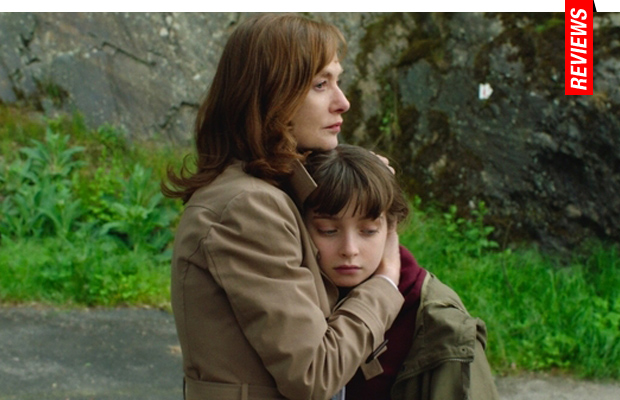Reviews
Barrage | 2017 Berlin International Film Festival Review
You’ll Like My Mother: Schroeder Stages Conflicted, Femme Centric Triplicate of Intergenerational Conflict
As the title succinctly suggests, Luxembourg’s Laura Schroeder navigates the trenchant, inescapable artificial obstructions we construct for ourselves and those closest to us with her sophomore title, Barrage. The director scores real-life mother and daughter duo Isabelle Huppert and Lolita Chammah for her protracted examination of control and rebellion crossing three generations of women from the same bloodline, which examines nature versus nurture for a troubled mother and daughter during an illicit attempt at establishing a bond after a decade of estrangement. Deliberately paced, Schroeder takes pains to focus on the ebb and flow of comfortable banality vs. brooding resentment in this careworn scenario, which mostly allows Chammah to flex her capabilities in a subtle performance as a young mother still new to the idea of parenthood and responsibility whilst trying to forge a confident new identity atop the wounds of a troubled past barely scabbed over.
Preadolescent Alba (Themis Pauwels) has been raised by her grandmother Elisabeth (Huppert) for the past decade, while her mother Catherine (Chammah) has been mysteriously absent living in Switzerland. However, Catherine has recently returned to reclaim a connection with her daughter, despite Elisabeth’s refusal to answer her phone calls. Showing up unexpectedly one day, Catherine asks to take Alba on a daytrip, which turns into something more like kidnapping when she whisks her child off to their summer vacation home in hopes to build a meaningful connection with a young girl who has grown up feeling abandoned by her mother and manipulated by her grandmother.
Chammah and Huppert (whose current international acclaim for Elle and Things to Come should assist in attracting a high level of interest in Schroeder’s film) last shared the screen in Marc Fitoussi’s 2010 comedy Copacabana, where they starred in a completely different mother-daughter dynamic. In this more somber, dramatic rendition, Chammah is the troubled centerpiece, a woman who battled some severe issues which are never clearly spelled out, though drug and/or alcohol addiction, along with passing references to Alba’s absent, unnamed father, suggest a whole slew of rebellious outbursts perhaps as a way to needle her controlling mother, a woman seemingly hell-bent on raising a well-groomed tennis athlete.
Our first visualizations of Elisabeth and Catherine are shots of two women on the same side of a tennis net, yet viewed from different vantage points, Huppert as a controlling figure shot from inside the tennis court, while Chammah’s unfettered profile observes her spying on her daughter Alba’s training, a similar routine she herself experienced, one which conjures a mixture of unresolved emotions.
Schroeder carefully constructs a series of similar visual boundaries, such as Catherine’s suggestion she take her daughter on a day trip to the zoo, a place where live subjects are kept in cages for mankind’s ambivalent perusal. The presence of a dog and its subsequent tragic end on their surprise road trip suggests animals blindly running free from their masters will be reined in brutally, not unlike the circumstances which led Catherine to be isolated in Switzerland. Not all such barriers and constructs are negative, as a referenced dam assisting the passage of fish granted predetermined passage through manmade interferences with nature. However, both sets of mothers and daughters in Barrage are shown to be at irrevocable odds.
Huppert, who appears briefly to bookend the film, flexes her manipulative talents early on when Chammah suddenly shows up at her home. “You look rather well, for a change,” she snidely comments, whisking young Alba up the stairs by proclaiming her mother’s visit is surely an inconvenience (“Candy time,” she cheerily presses as she pops pills into the girl’s mouth), pressing the young child to ignore the strange woman, whose absence to others has necessitated a lofty fantasy claiming Catherine to be a singer constantly on tour. In later sequences, the controlling Elisabeth doesn’t so much resort to hysterical emotional blow-outs, despite a slew of untested snippets. “What are you insinuating?” she demands when Catherine questions why Alba sleeps in her grandmother’s bed when scared. Betwixt the two women, newcomer Themis Pauwels gives a precocious performance as a young girl initially disinterested in her somewhat unhinged mother, but who eventually comes to appreciate her company.
Despite Chammah’s range, which is a reflection of a similar unkempt, isolated female she played in Sophie Letourneur Gaby Baby Doll (2014), Schroeder’s film sometimes feels a bit glacially paced, also hobbled by a familiar scenario and dynamic (Sherrybaby comes to mind, initially). A lone dream sequence, which features Kubrickian styled animal masks during a slow-motion dance party set to the Juan Llossas’ tango Einmal Ist Keinmal introduces a bizarre, subconscious shading one wishes Schroeder had pushed even further, an element more often left to a pronounced soundtrack of various English language tracks.
Reviewed on February 10 at the 2017 Berlin International Film Festival – Forum Programme. 112 Mins.
★★★/☆☆☆☆☆
Los Angeles based Nicholas Bell is IONCINEMA.com's Chief Film Critic and covers film festivals such as Sundance, Berlin, Cannes and TIFF. He is part of the critic groups on Rotten Tomatoes, The Los Angeles Film Critics Association (LAFCA), the Online Film Critics Society (OFCS) and GALECA. His top 3 for 2021: France (Bruno Dumont), Passing (Rebecca Hall) and Nightmare Alley (Guillermo Del Toro). He was a jury member at the 2019 Cleveland International Film Festival.


























